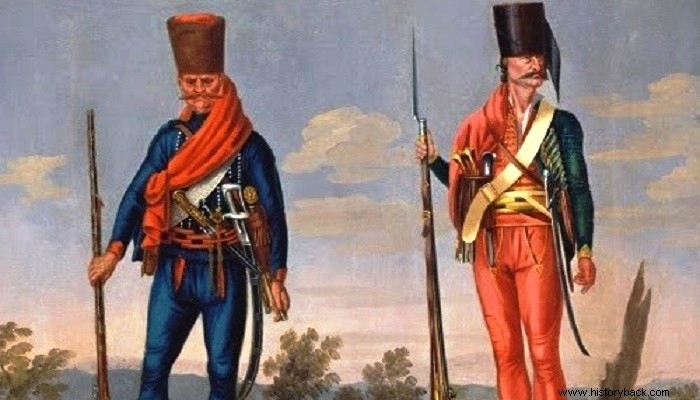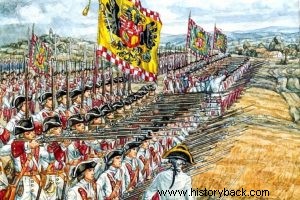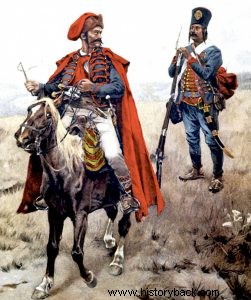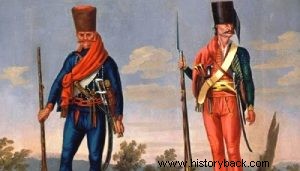
In 1745 Europe was again in flames for 5 years already, from one end to the other. The cause was the War of the Austrian Succession (1740-48), Austria's war of survival against France and its German allies and (at intervals) Prussia. The French had decided to "finish off" the Habsburgs from the imperial throne of the Holy Roman Empire of the German Nation (Reich) by placing on it their own puppet, the Elector of Bavaria Charles VII.
The French and Bavarians had managed to capture as far as Prague, invading as deep as Bohemia. They were repulsed and the Austrians in turn invaded Bavaria, but in the autumn of 1744 the French and Bavarians, taking advantage of the Prussian pressure against the Austrians in the east, recaptured Bavaria. Shortly after this success, however, Charles of Bavaria died and the French dream of dethroning the Habsburgs began to fade. Charles's successor was Maximilian's son Joseph who vacillated between Austria and France. But Maximilian didn't seem to be making up his mind and the Empress of Austria Maria Theresa decided to push things...
Invasion, conflict and pursuit
The Austrian Crown Princess ordered her Hungarian general Joseph Batiani to invade Bavaria and if possible subjugate it or force it to side with the Empire. Batiani had only 10,000 men at his disposal, of which a sufficient number were irregular Pandurs (light infantry from the Balkan provinces of the Habsburgs, mainly Slovenes, Croats, Serbs, but also Greeks). On the other hand, however, the situation for the Bavarians was worse.
Maximilian von Thöring's Francophile foreign minister and general had small forces at his disposal and so when he learned of the impending Austrian invasion he retreated westward awaiting French reinforcements. In the meantime, Batiani advanced and captured the cities of Aberg and Filshofen. In the meantime France sent a small force to Bavaria under Henri François comte de Seguire. France was fighting hard in the Netherlands with the British and Dutch and could not deploy stronger forces in the region. So Segir found himself with only 7,000 men.
Segir failed to join his Bavarian allies who were waiting encamped in the Palatinate city of Pfaffenhofen. The only reinforcements the French general received were a few men of the Palatinate army on April 14, 1745. Seguir seeing that nothing could be expected decided to retreat west, but the Austrians, thanks to their immovable hussars, had a full view of the enemy's movements. . So Batiani decided to attack.
When knives talk
The Austrians approached the city early in the morning of April 15 and immediately attacked the city with the Panduri vanguard. Only 6,000 Austrians took part in the battle. The French were taken by surprise, but entrenched in the houses of the town they put up a strong resistance. However, the Pandurs were experts in "small war" conflicts and street battles, and shouldering their weapons, they charged with swords and knives against the French.
Terrifying scenes followed. Heads, arms, legs were flying in the air, blood was flowing and the screams of the slaughtered vibrated the atmosphere. Seghir managed to form a rough line of battle on a hill west of the city but when the main Austrian force arrived the French could not hold out. Another attempt to contain the Austrians by the French failed, and Seghir ordered the remnants of his forces to retreat.
Panicked, the French retreated in order to reach the west bank of the Paar by the only bridge in the area. But Batiani's hussars and Pandurs pursued them and slaughtered anyone who arrived. With difficulty Segir managed to maintain the organic bonds of his divisions and finally crossed the river. This saved the French from total destruction. The retreating French reached the Lech River the next day, but on 17 April Austrian light troops overtook them and panic ensued.
Eventually the French managed to cross the Lech River and then destroyed the only bridge in the area preventing further pursuit of the Austrians. The battle had ended in Austrian victory. The French had abandoned all their guns and supplies while losing over 2,400 men, compared to 800 Austrian casualties. But the worst thing for France was that after the defeat, Maximilian of Bavaria sided with Austria.


The general and later marshal Batiani.

Hussar and panduro of the Austrian army.

Pandurs of the Austrian army.
PANTELIS D. KARYKAS
